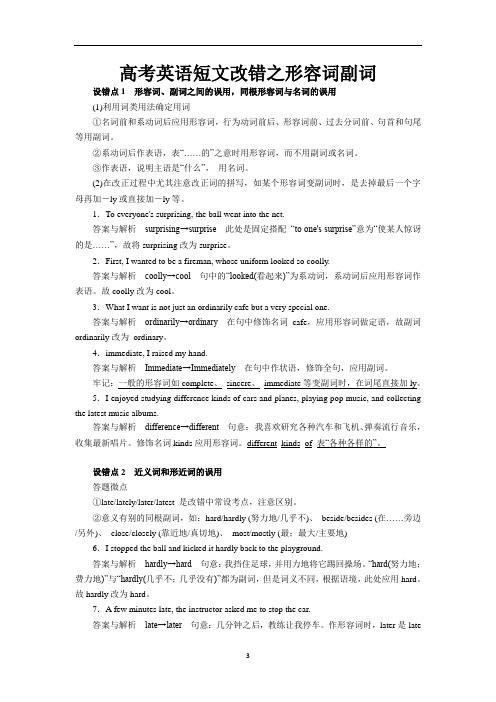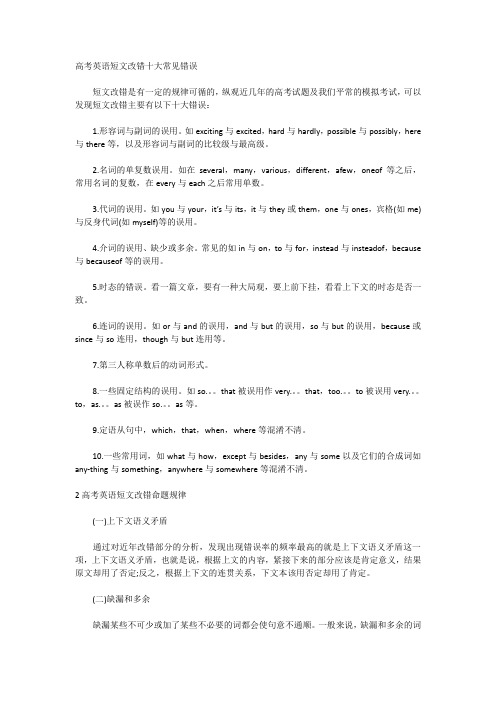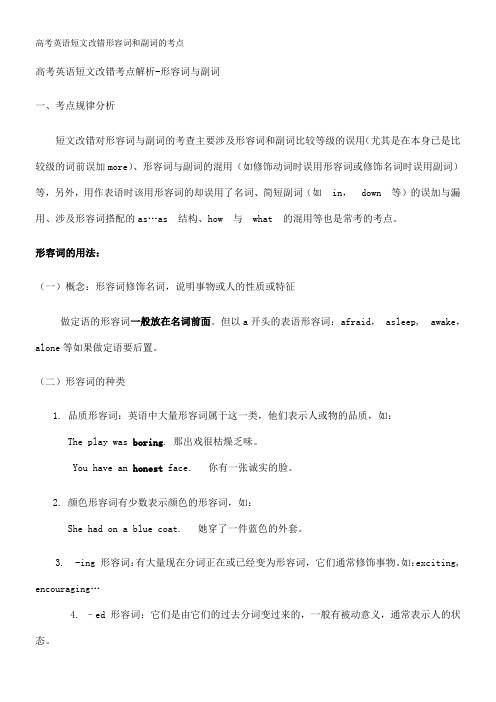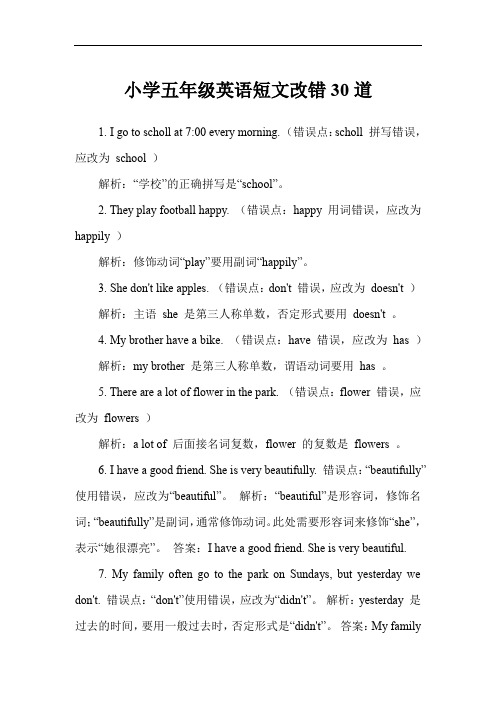短文改错 形容词副词
高考英语短文改错之形容词副词

高考英语短文改错之形容词副词设错点1形容词、副词之间的误用,同根形容词与名词的误用(1)利用词类用法确定用词①名词前和系动词后应用形容词,行为动词前后、形容词前、过去分词前、句首和句尾等用副词。
②系动词后作表语,表“……的”之意时用形容词,而不用副词或名词。
③作表语,说明主语是“什么”,用名词。
(2)在改正过程中尤其注意改正词的拼写,如某个形容词变副词时,是去掉最后一个字母再加-ly或直接加-ly等。
1.To everyone's surprising, the ball went into the net.答案与解析surprising→surprise此处是固定搭配“to one's surprise”意为“使某人惊讶的是……”,故将surprising改为surprise。
2.First, I wanted to be a fireman, whose uniform looked so coolly.答案与解析coolly→cool句中的“looked(看起来)”为系动词,系动词后应用形容词作表语。
故coolly改为cool。
3.What I want is not just an ordinarily cafe but a very special one.答案与解析ordinarily→ordinary在句中修饰名词cafe,应用形容词做定语,故副词ordinarily改为ordinary。
4.immediate, I raised my hand.答案与解析Immediate→Immediately在句中作状语,修饰全句,应用副词。
牢记:一般的形容词如complete、_sincere、_immediate等变副词时,在词尾直接加ly。
5.I enjoyed studying difference kinds of cars and planes, playing pop music, and collecting the latest music albums.答案与解析difference→different句意:我喜欢研究各种汽车和飞机、弹奏流行音乐,收集最新唱片。
短文改错专题

2. I’m glad to say that anything has worked out fine
in the dorm.
myself
nothing what
3.You’d better keep that he said in mind
4. When we walked to the car, Bill smiled and shook ∧ head. 5. And I can’t forget the good food you cooked for I.
it on 3 o’clock this afternoon.
owner to call me after she saw it. Later, a girl came to claim
at
(2013年辽宁卷)Mr. Johnson is a hardworking teacher. Every day, he spends too much time with his work. With little sleep and hardly any break, so he works from morning till night. Hard
Unfortunately
5. I’m sure we’ll have a wonderfully time together.
wonderful
连词
备考方向:
并列连词and\but\or
1.熟悉从句各类连词:
名词性从句 连接词
定语从句
状语从句
2.分析句子成分,分清各种从句和逻辑关系 3.掌握一些连词的固定习惯用法
高考英语短文改错· 介词
短文改错形容词副词解析及练习

短文改错专题〔一〕形容词和副词一、考点聚焦1、形容词、副词的语法作用与位置形容词是用来修饰名词的,常被放在名词前作定语,或放在系动词后面作表语。
而副词那么用来修饰形容词、动词,其他副词或者句子,一般位于形容词之前,动词之后或句子之首。
视觉成像以下属几种特殊情况,须牢记;〔1〕形容词短语作定语,定语后置。
a language difficult to master, a leaning tower about 180 feet high〔2〕表语形容词〔afraid、alike、alone、asleep、awake、alive等〕作定语,定语后置。
如a man alive。
有些表身体安康状况的形容词如well、faint、ill只作表语。
sick既可作表语又可作定语,ill如作定语意为“bad〞。
〔3〕用作定语,修饰由不定代词one、no、any、some和every构成的复合词如anything、something等时,通常后置。
如:I have something important to tell you.〔4〕else常用作疑问代词和不定代词的后置定语。
〔5〕enough、修饰名词前置,enough修饰形容词、副词时,必须后置。
(6)形容词变副词:①规那么②例外:不规那么变化〔9个〕good many such fast prettyearly enough no right〔7〕特殊形容词副词①以下单词以-ly结尾,但却是形容词而非副词:lively、lonely、lovely、deadly、friendly、ugly、silly、likely、brotherly、timely等。
②表愿意〔无-ly〕和引申意(有-ly)的副词:深wide宽广high高low位置低深入地widely广泛地highly高度地lowly地位卑微③有无-ly意义大不一样的副词:dead完全,绝对be dead asleepdeadly非常be deadly tiredpretty相当be pretty ce rtain that…prettily漂亮地be prettily dressedclose近Don’t sit close.closely密切地Watch closely!late晚、迟arrive late, e latelately最近I haven’t seen him lately(recently).hardhardly3、形容词和副词的比拟等级〔1〕原级的构成和用法。
高考英语短文改错十大常见错误

高考英语短文改错十大常见错误短文改错是有一定的规律可循的,纵观近几年的高考试题及我们平常的模拟考试,可以发现短文改错主要有以下十大错误:1.形容词与副词的误用。
如exciting与excited,hard与hardly,possible与possibly,here 与there等,以及形容词与副词的比较级与最高级。
2.名词的单复数误用。
如在several,many,various,different,afew,oneof等之后,常用名词的复数,在every与each之后常用单数。
3.代词的误用。
如you与your,it’s与its,it与they或them,one与ones,宾格(如me)与反身代词(如myself)等的误用。
4.介词的误用、缺少或多余。
常见的如in与on,to与for,instead与insteadof,because 与becauseof等的误用。
5.时态的错误。
看一篇文章,要有一种大局观,要上前下挂,看看上下文的时态是否一致。
6.连词的误用。
如or与and的误用,and与but的误用,so与but的误用,because或since与so连用,though与but连用等。
7.第三人称单数后的动词形式。
8.一些固定结构的误用。
如so.。
that被误用作very.。
that,too.。
to被误用very.。
to,as.。
as被误作so.。
as等。
9.定语从句中,which,that,when,where等混淆不清。
10.一些常用词,如what与how,except与besides,any与some以及它们的合成词如any-thing与something,anywhere与somewhere等混淆不清。
2高考英语短文改错命题规律(一)上下文语义矛盾通过对近年改错部分的分析,发现出现错误率的频率最高的就是上下文语义矛盾这一项,上下文语义矛盾,也就是说,根据上文的内容,紧接下来的部分应该是肯定意义,结果原文却用了否定;反之,根据上下文的连贯关系,下文本该用否定却用了肯定。
【短文改错】优秀英语短文改错6篇,带详解

短文改错语篇训练(1)When I was a child,I hoped to live in the city. I think I would be happy there. Now I am living in a city,but I miss my home in countryside. There the air is clean or the mountains are green.Unfortunately,on the development of industrialization, the environment has been polluted. Lots of studies have been shown that global warming has already become a very seriously problem. The airs we breathe in is getting dirtier and dirtier. Much rare animals are dying out.We must found ways to protect your environment.If we fail to do so, we’ll live to regret it.【参考答案】1.think→thought 考查时态,我认为我在大城市会快乐,描述过去的动作,应用一般过去时。
2.in countryside→in the countryside 本题考查冠词,in the countryside为固定搭配。
3.or→and 考查连词,需要判断前后句关系,前后为并列而非转折。
4.on→with 考查介词,with 表示伴随。
5.去掉been 考查谓语动词中语态问题,研究与表明之间无被动关系。
6.seriously→serious 考查形容词与副词,形容词用来修饰名词或代词,或者放在be动词后作表语,副词修饰形容词或动词。
高考短文改错题例说

高考短文改错题例説摘要:短文改错旨在考测学生发现,判断及纠错的能力.短文大约100字,以记叙文为主,题材贴近学生生活.是全面考查学生基础知识和灵活应用语言能力的一种测试。
关键词:高考短文改错题近年来短文改错试题命制的一些共同特点:1.题材轻松,内容浅显.2.考查分布:一致性,平行结构,词义重叠,名词复数,短语与冠词,动词曲折词缀,句的连接与逻辑,各种从句使用.使用错误的分析:一、动词的使用错误:包括:时态,语态,用法,非谓语动词,及物不及物动词,使役动词,感官动词,系动词,主谓一致及一些难分辨的动词的使用错误.1.时态错误:例:★we were driving along a narrow road when the car stop working.(stop---stopped)★i fthebook you will want is out ,you may ask for it to be called back for you,… (去掉will)2.语态问题:★i put them in the book case which∧ left in my office . (was)★after an hour or so we hagan to feel veryfrightening.(frightening ----frightened)3.用法问题:★ i had always wanted∧ return to the village.(to)★i went back to get david and helped him to stoodup.(stood--stand)4.非谓语动词:★play football not only makes us grow up tall and strong but also… (play---playing)★soon i hagan to enjoy talk to…(talk--talking)5.平行结构问题:★then i put my book under my desk,opening it and started looking…(opening---opened)★i remembers her words and calm down ,i did a good job and won the first prize. (calm---calmed)6.动词短语的问题:★they ∧eager to know everything about china and asked me…(were)7.及物不及物动词:★it seemed to understand which he said. (which--what) 8.使役动词,感官动词和系动词,★he was made ∧work 14 hours a day at that time. (to ) ★the soup tom made tasted well. (well---good)9.时态一致:★it was very kind of them to meet me at the railway station and drove me to their home.(drove---drive)★the new boy or girl in school quickly become one of the class after a few games.(become--becomes)二、冠词的使用错误:★suddenly, i caught a sight of my english teacher in the crowd.(去掉a, catch sight of是一固定短语 )★some people read the books or watch television which others have sports.(去掉the )(一般情况下表官衔职位的名词前无冠词,但如果某一职位指定某人时,该名词前需加冠词.)注意以下这些含有冠词的常用短语.a lot of , a number of,as a result,at the foot of , at the edge of ,the same as, in front of(外部前面),in the front of(在里面的前面)out of question (毫无疑问)out of the question三、名词的使用错误:一般反映在:(1)可数与不可数的判断,切不可用中文思维来判断英语中名词的可数不可数性(2)注意名词的单复数应一致,以及名词与冠词的搭配.(3)名词的所有格的用法.★she said that she and my schoolmate all wished me success.(schoolmates)★i hope that you two could come and visit us some times soon(times-time)四、介词的使用错误:学生在改错时往往忽视英语介词远比汉语介词活跃这一特性,介词常和活跃的动词搭配,构成一些固定表达法.因此在改错时,应该经常注意,记忆一些含有介词的习惯用法.★bill insisted in spaning near the car.(in-on )★when i have free time i go ∧a long walk.(for)五、形容词,副词的使用错误:主要表现在形容词副词的比较等级使用方面,以及形容词修饰名词或做表语定语.副词修饰动词,形容词和其他副词这些主要用法. ★people in the modern world generally live much more longer than before(去掉more)★in some places ,you may borrow∧ many books as you want.(as)特别提醒9hard-hardly ,near-nearly, late-lately 两词用法上无关联friendly,lonely,lovely 等虽以ly结尾但为形容词而不是副词六:连词的使用:and, therefore(语意相承)but, however(语意转折 ba cause-so though/although---but(前后只能用一个,不可连用)not..until,as…as(两个都不省,连用时两者不可缺少)if---unless (语意相反)★therefore ,ther are still some countries where people have shorter lives.(therefore---however)★she was smiling but nodding at me (but-and )★football player from japan can not play with a player from england.(去掉not)七:代词的使用错误:1.人称代词的主格,宾格.形容词性的物主代词和名词性物主代词的正确使用.2.和不能引导定语从句3.不定代词的使用应根据上下文,句子的肯定,否定,疑问,从语义上作出正确判断★i didn’t see nobody just sit doing nothing at all (nobody---anybody/anyone)★now someone at home reads instead.(someone---everyong) ★…in any other words, i aman only child.( 去掉any) 八.词义的重叠:★today i visited the smiths,--my first time visit to…(去掉time)★first, let me tell you something more about myself.( 去掉more)★whenever i see him i will often think of my english teacher.(去掉often)。
高考英语短文改错形容词和副词的考点

高考英语短文改错形容词和副词的考点高考英语短文改错考点解析-形容词与副词一、考点规律分析短文改错对形容词与副词的考查主要涉及形容词和副词比较等级的误用(尤其是在本身已是比较级的词前误加more)、形容词与副词的混用(如修饰动词时误用形容词或修饰名词时误用副词)等,另外,用作表语时该用形容词的却误用了名词、简短副词(如in,down 等)的误加与漏用、涉及形容词搭配的as…as结构、how 与what 的混用等也是常考的考点。
形容词的用法:(一)概念:形容词修饰名词,说明事物或人的性质或特征做定语的形容词一般放在名词前面。
但以a开头的表语形容词:afraid, asleep, awake,alone等如果做定语要后置。
(二)形容词的种类1. 品质形容词:英语中大量形容词属于这一类,他们表示人或物的品质,如:The play was boring. 那出戏很枯燥乏味。
You have an honest face. 你有一张诚实的脸。
2. 颜色形容词有少数表示颜色的形容词,如:She had on a blue coat. 她穿了一件蓝色的外套。
3. -ing 形容词:有大量现在分词正在或已经变为形容词,它们通常修饰事物。
如:exciting, encouraging…4. –ed形容词:它们是由它们的过去分词变过来的,一般有被动意义,通常表示人的状态。
She looked tired.5. 合成形容词: warm-hearted 热心的, heart-breaking 令人心碎的(三)形容词的用法:常用作定语、表语和补足语,有时也做状语。
形容词在句中的位置:有的形容词放在被修饰的名词之前,称为前置形容词;少数形容词放在被修饰的名词之后,称为后置形容词。
副词的用法:(一)概念:用以修饰动词、形容词或其他副词的词叫做副词。
例如: not(不),here(这里),now(现在)。
不少副词同时也可用作介词或其它词类。
小学五年级英语短文改错30道

小学五年级英语短文改错30道1. I go to scholl at 7:00 every morning. (错误点:scholl 拼写错误,应改为school )解析:“学校”的正确拼写是“school”。
2. They play football happy. (错误点:happy 用词错误,应改为happily )解析:修饰动词“play”要用副词“happily”。
3. She don't like apples. (错误点:don't 错误,应改为doesn't )解析:主语she 是第三人称单数,否定形式要用doesn't 。
4. My brother have a bike. (错误点:have 错误,应改为has )解析:my brother 是第三人称单数,谓语动词要用has 。
5. There are a lot of flower in the park. (错误点:flower 错误,应改为flowers )解析:a lot of 后面接名词复数,flower 的复数是flowers 。
6. I have a good friend. She is very beautifully. 错误点:“beautifully”使用错误,应改为“beautiful”。
解析:“beautiful”是形容词,修饰名词;“beautifully”是副词,通常修饰动词。
此处需要形容词来修饰“she”,表示“她很漂亮”。
答案:I have a good friend. She is very beautiful.7. My family often go to the park on Sundays, but yesterday we don't. 错误点:“don't”使用错误,应改为“didn't”。
解析:yesterday 是过去的时间,要用一般过去时,否定形式是“didn't”。
- 1、下载文档前请自行甄别文档内容的完整性,平台不提供额外的编辑、内容补充、找答案等附加服务。
- 2、"仅部分预览"的文档,不可在线预览部分如存在完整性等问题,可反馈申请退款(可完整预览的文档不适用该条件!)。
- 3、如文档侵犯您的权益,请联系客服反馈,我们会尽快为您处理(人工客服工作时间:9:00-18:30)。
短文改错之形容词与副词
考点1形、副词或名词词性混淆
[典例1] Lots of studies have shown that global warming has already become a very seriously problem.(2015·全国Ⅰ)
[典例2] Dad and I were terrible worried.(2015·全国Ⅱ)
[典例3] The fruits are small in size,but juicy and taste.(2014·新课标全国Ⅰ)
考点2形、副词错用
[典例1] Nearly five years before,and with the help of our father,my sister and I planted some cherry tomatoes(圣女果) in our back garden.(2014·新课标全国Ⅰ)
分析相对于说话时以前用ago;相对于过去的某个时间或动作之前才用before。
故before改为ago。
[典例2] As a result,the plants are growing somewhere.
(2014·新课标全国Ⅰ)
[典例3] I remember my grandfather very much.(2013·新课标全国Ⅰ)
考点3修饰词错用或多余
[典例1] Much rare animals are dying out.(2015·全国Ⅰ)
[典例2] He liked it so very much that he quickly walked into the shop.(2015·全国Ⅱ) [典例3] We don’t need to do so many homework.(2014·新课标全国Ⅱ)
考点4比较等级误用
[典例1] My mum makes the better biscuits in the world,so I decided to ask her for
help.(2015·陕西)
[典例2] To make matters bad,now I have to share a room with my younger sister,Maggie.(2013·浙江)
考点5分词化形容词混用
[典例1] I am awfully tiring,but I know I’ll never fall asleep.(2013·浙江)
[典例2] Gradually,I became interesting in biology and chose to learn biology when I entered the college.
分析对……感兴趣,应该用interested。
故interesting应改为interested。
方法归纳对于形容词和副词的考查,注意以下几点:作定语、
作状语,修饰动词、形容词、全句,用副词。
注意比较级与最高级的比较对象或范围;单音节形容词的比较级前,
注意many,much,,;very,so,,
改错(每小题1处错误)
1.On the left-hand side of the class,I could easy see the football field.
2.I thought the biscuits were really well.
3.That is too much for us,considering how closely the houses are.
4.Don’t panic or get out of line and try to remain quiet and calmly.
5.Beside,Cleo tends to bark an average of six hours a day.
6.No one in the carriage had previous spoken to or even noticed the ticket owner
before.
7.My uncles immediate jumped up and shot their arrows at the bird.
8.Today we had a chemistry test. I found the test difficulty,but I tried hard to do it. 9.After waiting for about half an hour,I was beginning to get impatiently. 10.Whenever I think of the old days,I feel very happily.
一、常考考点
1.形容词和副词的混用,是短文改错中常见的考点之一;
2.比较级和最高级的混用或误用;
3.比较级和最高级修饰语的误用。
二、解题智囊:“两搞清两熟悉”
1.搞清形容词或副词在句中充当的成分及其所修饰的词语,判断是否存在误用情况。
2.。
